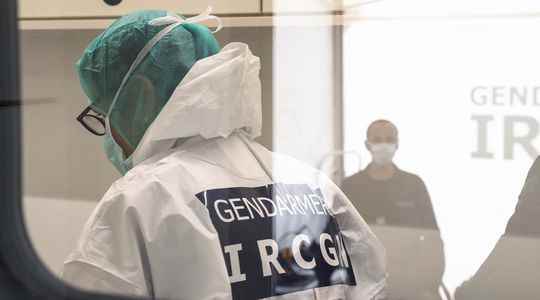They arrived Monday, April 13 in Ukraine. Sixteen French gendarmes from the Criminal Research Institute of the National Gendarmerie (IRCGN) were sent there to identify the victims found since the withdrawal of Russian forces near kyiv, and to determine the causes of their death. Their mission, under the responsibility of the Ukrainian security forces, has an “indefinite” duration. But shifts are already planned, explained General Patrick Touron, commander of the judicial center of the gendarmerie, a sign of the extent of the work awaiting these experts.
Because more than 1,200 bodies have been discovered to date near the capital. Some on the streets, others in their homes and several dozen in mass graves. Many, in view of the first observations, seem to have been coldly executed, sometimes after being raped, tortured. Russia, as usual, denies any abuse and cries “fake” to clear customs.
This is where international experts, such as the French, come into play. Their analyzes will be used by the kyiv prosecutor to conduct his (very) numerous investigations for “war crimes”, for which France, according to statements by Emmanuel Macron on April 8, was already working to “gather evidence”. Making these tortured bodies speak could make it possible to bring the culprits to justice, in Ukraine or in The Hague, where the International Criminal Court (ICC) is also investigating. Like the “butcher of Boutcha”, Azatbek Omurbekov. And maybe even Vladimir Putin, one day.
Mobile laboratory
How will the French gendarmes work? “Something that is very important when you arrive at a crime scene in mainland France or elsewhere is to do what is called freezing the scene, that is to say fixing the scene with a model in three dimensions”, explains to France info Colonel Franck Marescal, director of the IRCGN. The team knows the delicate scenes rather well and had already been dispatched to Lebanon, in 2020, after the double explosion in the port of Beirut in order to identify the bodies.
Technically, these gendarmes rely on state-of-the-art equipment, including a mobile laboratory for DNA analysis, as well as a truck carrying twelve cold mortuary chambers to store autopsied bodies. In addition to identification specialists, two ballisticians, an explosives specialist and two forensic scientists are part of the trip, according to the IRCGN.
“For the record, France also supports the International Criminal Court by sending two magistrates, ten investigators, as well as an exceptional additional financial contribution of 500,000 euros, in addition to the annual funding it provides for its operation. regular,” the Foreign Ministry statement said about the deployment.
Other IRCGN soldiers could arrive in support depending on the missions that will be requested, specifies General Patrick Touron. What, in coordination with other international experts, to support a nation every day a little more upset by macabre discoveries.
